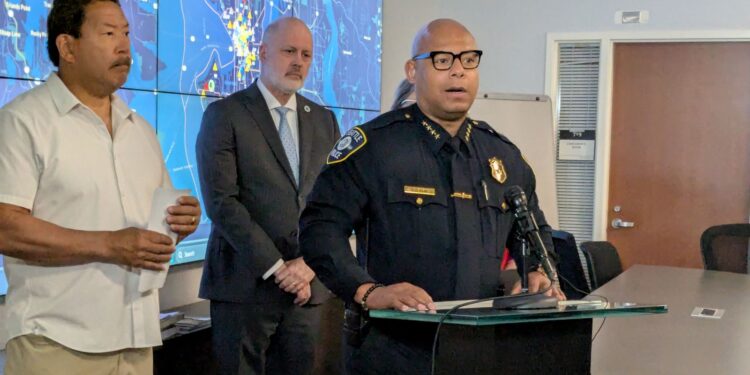Seattle City Council approved surveillance camera installations in three neighborhoods this week, advancing a public safety initiative that has drawn opposition from privacy advocates and immigrant rights groups.
The legislation, which now awaits Mayor Bruce Harrell’s signature, would place cameras in the Stadium District, near Garfield High School, and at Cal Anderson Park. Council members passed the measure despite hours of public testimony opposing the expansion.
Police Chief Shon Barnes defended the surveillance program, emphasizing protective measures governing the Real-Time Crime Center’s operations. Video footage is automatically deleted after five days unless connected to active investigations, with access restricted to 28 background-checked personnel.
“The restrictions, limitations, policies, and systems I outline are important, not because I believe they are perfect, but because we have designed them to address foreseeable concerns,” Barnes wrote to council members.
The cameras monitor only public spaces including streets, sidewalks, and parks, with privacy masks blocking residential areas and private properties. Barnes stressed that surveillance is reactive rather than continuous, activated only during emergency responses or crime investigations.
Privacy advocates remain skeptical about federal data access. Taryn Darling of the Seattle Community Police Commission referenced recent investigations showing Immigration and Customs Enforcement’s misuse of state licensing databases for enforcement actions.
“That would be great if we do get a subpoena from the feds, but the feds are accessing this data in other communities short of subpoena,” Darling said, noting federal authorities have circumvented legal processes elsewhere.
The ACLU of Washington cited Philadelphia’s experience, where federal agencies used automated license plate readers to track undocumented residents without formal legal requests.
Council members addressed these concerns by approving a 60-day operational pause if federal immigration authorities seek video access through courts.
The expansion reflects growing public pressure for enhanced safety measures across Seattle. Existing cameras have proven effective in recent incidents, including an August assault at Third and Pine streets and various drug seizures.
Business owners and residents have increasingly requested surveillance installations as part of broader public safety strategies. The technology has enabled faster police deployment and evidence collection in criminal investigations.
The mayor’s office has not responded to requests for comment regarding approval timeline for the legislation.







